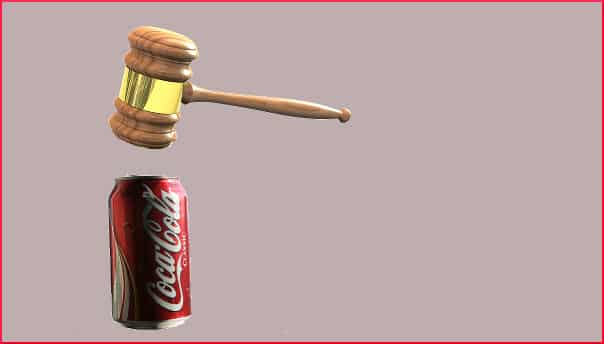
In the previous post, Childhood Obesity News remarked on the surprise felt by some observers when two prominent black clergymen signed on as plaintiffs in the Praxis Project lawsuit against Coca-Cola. The “party line” is that the corporation has always been good to African-American organizations and causes., but critics believe that any kindness shown by the company is only shifting of funds from conventional advertising to expenditures that appear to support social progress. In other words, the cynical ulterior motive has always been just to promote the brand.
But the Praxis case is by no means the only racially-connected legal matter that Coke is involved in. A class-action suit dating from way back in 1999 was finally settled last summer. The class contains about 2,000 members, all of whom worked for the company between 1995 and 2000. (Being as how this was filed almost 20 years ago, some of those employees are already dead.)
Journalist Justine Bachman wrote:
The Coca-Cola Co. agreed today to pay $192.5 million to settle a racial discrimination suit by black workers. The amount includes $113 million in cash, $43.5 million to adjust salaries, $36 million for oversight of the company’s employment practices. Coke also will pay $20 million in attorneys’ fees and plans to donate $50 million to its foundation for community programs.
Another result of this excruciatingly prolonged lawsuit is that the company also agreed to let a third party review its hiring practices. Other areas of contention are the pay, promotions, and job evaluations of employees once they have been hired. Public relations-wise, it takes a lot of donations to the National Association for the Advancement of Colored People to counteract the bad impression left by nearly $200 million worth of discrimination.
Getting back to the Praxis case
One goal is to compel Coke to stop deceptive advertising directed at adults, and to refrain from the creation of advertising that targets kids under age 12. Also, to somehow protect kids from the advertising that is aimed at adults, for instance, by limiting it to certain television time slots when children are presumably asleep.
Another goal is to stop Coke (and hopefully, by example and by extension, other manufacturers) from denying that its products are linked to obesity, diabetes, and related harmful medical conditions. The public should also not be lied to about the effects of sugar consumption, particularly by “Health Professional Partners” who are hired to spread falsehoods via social media.
In another case, multi-district litigation was instituted against the corporation by consumers who see its advertising practices as misleading. Consumers from California, Florida, Illinois, Massachusetts, New York, and New Jersey challenged the claim that Coke contains no artificial ingredients or preservatives.
Phosphoric acid, in particular, is a preservative, and is part of the beverage’s formula. The consolidated class action suit survived several attempts at dismissal, and other attempts to stall the case as long as possible, with the object of interfering with the discovery process.
Journalist Robert J. Boumis explained the lawyerly shenanigans:
Back in June, the Coca-Cola Company filed a motion asking for a “temporary halt of litigation” pending the outcome of a group of similar cases in the Ninth Circuit Court of Appeals. Coca-Cola argued that these cases were all directly related to the mass tort against Coke. However, the plaintiffs filed a motion on July 5 arguing that the real motivation behind the cola conglomerate’s motion to “pause” the litigation was to delay discovery by more than a year while these other cases worked their way through the courts and appeals process.
A few days after that was published, a judge denied Coke’s motion to put everything on hold, clearing the way for the plaintiff’s lawyers to turn it into the class-action suit, which is still making its way through the system.
Your responses and feedback are welcome!
Source: “Coke Announces $192.5 Million Settlement,” ABCNews.go.com, 11/16/17
Source: “Coca-Cola Drinkers Seek Class Cert. in Artificial Ingredients Class Action,” TopClassActions.com, 06/20/17
Source: “Coca-Cola Delays Debated in Artificial Ingredients MDL,” TopClAssactions.com, 07/11/16
Photo credit: Chris Potter (ccPixs.com), Allen (vwb5) on Visualhunt/CC BY

 FAQs and Media Requests:
FAQs and Media Requests: 











